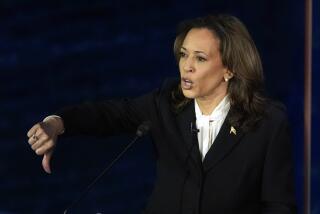The Right Note in Poland
- Share via
Vice President George Bush’s visit to Warsaw is the most visible manifestation of the improving relations between Poland and the United States, and Bush is striking the right note. He promises that America will help Poland obtain the economic assistance that Poland badly needs. But he makes it clear that the extent of U.S. help will depend on the degree to which the Communist regime comes to terms with the democratic aspirations of the Polish people.
President Reagan imposed economic sanctions on Poland in late 1981 and 1982 in retaliation for the Communist regime’s declaration of martial law and its crackdown on Solidarity, the independent trade union that had become the vehicle for pressures in behalf of economic and political liberalization. The last of the U.S. sanctions were lifted last February in response to the release of political prisoners and other conciliatory gestures--and in recognition of the fact that leaders of Solidarity and the Roman Catholic Church in Poland wanted the sanctions removed.
However, the Polish economy remains in deep trouble, and President Wojciech Jaruzelski and other Polish leaders have acknowledged that genuine economic recovery requires substantial new credits from the West.
Bush, in a meeting with Jaruzelski on Sunday, affirmed that Poland’s efforts to consolidate and reschedule its huge $35-billion foreign debt now have U.S. blessing within the Paris club of Western financial officials. Washington, however, is withholding a decision on whether to help Poland secure favorable loan treatment from the World Bank and the International Monetary Fund.
Jaruzelski, in turn, pledged more moves toward liberalization, including moderation of laws that restrict free association and more dialogue with consultative councils. However, he flatly refused to entertain the idea of any power-sharing with the outlawed Solidarity movement.
Bush dramatized America’s own continuing support for Solidarity by meeting with Lech Walesa, the leader of the banned union, and giving him a ride in the vice presidential limousine and flashing a V-for-victory sign to a large crowd of Solidarity enthusiasts. Although the regime was clearly nettled, Bush was welcomed to the Council of Ministers only 90 minutes after standing shoulder-to-shoulder with Walesa and was later allowed to address the Polish people on television.
The bottom line seems to be that Poland’s Communist government wants economic help from America and is willing to tolerate a considerable degree of pro-Solidarity rhetoric from Washington--but stoutly resists meaningful power-sharing with non-Communists. The United States, for its part, will do less public hectoring of the regime, but the degree of economic cooperation will depend on the movement toward greater freedom and pluralism in Poland.
That’s a sensible approach.
More to Read
Sign up for Essential California
The most important California stories and recommendations in your inbox every morning.
You may occasionally receive promotional content from the Los Angeles Times.










